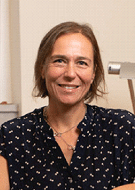
Amelia Glaser
Member-At-Large Candidate
Amelia Glaser is Professor of Slavic and Comparative Literature at the University of California, San Diego, where she also holds an endowed chair in Judaic Studies. Her research focuses on literary intersections between Ukrainian, Russian, and Yiddish, particularly in the territory of Ukraine. She teaches courses in comparative literature nineteenth- and twentieth-century Slavic literatures, and translation studies. She holds a Ph.D in Comparative Literature from Stanford University (2004), an M. St. In Yiddish from the University of Oxford (2000), and a BA in Comparative Literature from Oberlin College (1997). She is the author of Jews and Ukrainians in Russia’s Literary Borderlands (Northwestern U.P., 2012) and Songs in Dark Times: Yiddish Poetry of Struggle from Scottsboro to Palestine (Harvard U.P., 2020). She is the editor of Stories of Khmelnytsky: Competing Literary Legacies of the 1648 Ukrainian Cossack Uprising (Stanford U.P., 2015) and, with Steven Lee, Comintern Aesthetics (U. Toronto Press, 2020). She is a translator of poetry from, primarily, Ukrainian, Yiddish, and Russian. Glaser has spent the 2021-22 academic year as a Radcliffe fellow, where she has begun a book about Ukrainian poetry and community between 2014 and 2022.
Prof. Glaser has been a member of ASEEES since she was a graduate student in the early 2000s and regularly attends the annual convention. She has served on the Vucinich prize committee and has been involved in creating and participating in panels on Ukrainian and Yiddish studies. She is also an active member of AATSEEL, particularly as a frequent participant in their translation stream. She has served, as well, on the Yiddish committee for the MLA, and on the program committee of the AJS (Association for Jewish Studies). She is eager to give back to ASEEES, which has helped her to establish important intellectual and professional relationships since graduate school. As an ASEEES Board member at large, Glaser hopes to help foster attention to comparative studies within Eastern Europe and Eurasia, and in particular, to amplify the voices and work of Ukrainian scholars and writers.